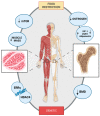The Impact of Anorexia Nervosa and the Basis for Non-Pharmacological Interventions
- PMID: 37299557
- PMCID: PMC10255390
- DOI: 10.3390/nu15112594
The Impact of Anorexia Nervosa and the Basis for Non-Pharmacological Interventions
Abstract
Anorexia nervosa is a psychiatric disorder with an unknown etiology that is characterized by an individual's preoccupation with their weight and body structure while denying the severity of their low body weight. Due to the fact that anorexia nervosa is multifaceted and may indicate the coexistence of genetic, social, hormonal, and psychiatric disorders, a description of non-pharmacological interventions can be used to ameliorate or reduce the symptoms of this condition. Consequently, the purpose of the present narrative review is to describe the profile's context in the anorexic person as well as the support they would require from their family and environment. In addition, it is aimed at examining preventative and non-pharmacological interventions, such as nutritional interventions, physical activity interventions, psychological interventions, psychosocial interventions, and physical therapy interventions. To reach the narrative review aims, a critical review was conducted utilizing both primary sources, such as scientific publications, and secondary sources, such as bibliographic indexes, web pages, and databases. Nutritional interventions include nutritional education and an individualized treatment for each patient, physical activity interventions include allowing patients to perform controlled physical activity, psychological interventions include family therapy and evaluation of the existence of other psychological disorders, psychosocial interventions include management of the relationship between the patient and social media and physical therapy interventions include relaxation massages and exercises to relieve pain. All these non-pharmacological interventions need to be individualized based on each patient's needs.
Keywords: anorexia nervosa; eating disorder; individual profile; interventions; microbiota; non-pharmacological; nutrition; physical exercise; psychology; therapy.
Conflict of interest statement
The authors declare no conflict of interest.
Figures


Similar articles
-
[Diversity of hospital care for anorexia nervosa in psychiatry in France].Encephale. 2022 Oct;48(5):517-529. doi: 10.1016/j.encep.2021.04.008. Epub 2021 Oct 30. Encephale. 2022. PMID: 34728068 French.
-
[The psychiatric comorbidity of anorexia nervosa: A comparative study in a population of French and Greek anorexic patients].Encephale. 2018 Nov;44(5):429-434. doi: 10.1016/j.encep.2017.07.005. Encephale. 2018. PMID: 29102367 French.
-
Understanding the 'Anorexic Voice' in Anorexia Nervosa.Clin Psychol Psychother. 2017 May;24(3):670-676. doi: 10.1002/cpp.2034. Epub 2016 Jul 20. Clin Psychol Psychother. 2017. PMID: 27435632
-
Is family therapy the most effective treatment for anorexia nervosa?Psychiatr Danub. 2011 Sep;23 Suppl 1:S175-7. Psychiatr Danub. 2011. PMID: 21894130 Review.
-
An Integrative Bio-Psycho-Social Theory of Anorexia Nervosa.Clin Psychol Psychother. 2017 Jan;24(1):1-21. doi: 10.1002/cpp.2047. Epub 2016 Oct 13. Clin Psychol Psychother. 2017. PMID: 27739190 Review.
Cited by
-
Neuroimaging and machine learning in eating disorders: a systematic review.Eat Weight Disord. 2025 Jun 1;30(1):46. doi: 10.1007/s40519-025-01757-w. Eat Weight Disord. 2025. PMID: 40450619 Free PMC article. Review.
-
Global Impacts of Western Diet and Its Effects on Metabolism and Health: A Narrative Review.Nutrients. 2023 Jun 14;15(12):2749. doi: 10.3390/nu15122749. Nutrients. 2023. PMID: 37375654 Free PMC article. Review.
-
Body image and willingness to change it-A study of university students in Poland.PLoS One. 2023 Nov 1;18(11):e0293617. doi: 10.1371/journal.pone.0293617. eCollection 2023. PLoS One. 2023. PMID: 37910539 Free PMC article.
-
The Nexus of Training Duration, Body Image, Nutritional Practices, and Mental Health: Insights from a Strength Training Cohort.Behav Sci (Basel). 2024 Mar 23;14(4):267. doi: 10.3390/bs14040267. Behav Sci (Basel). 2024. PMID: 38667063 Free PMC article.
-
Unveiling Skin Manifestations: Exploring Cutaneous Signs of Malnutrition in Eating Disorders.Cureus. 2023 Sep 6;15(9):e44759. doi: 10.7759/cureus.44759. eCollection 2023 Sep. Cureus. 2023. PMID: 37809242 Free PMC article. Review.
References
-
- Knekt P., Lindfors O., Laaksonen M.A., Raitasalo R., Haaramo P., Järvikoski A., Group H.P.S. Effectiveness of Short-Term and Long-Term Psychotherapy on Work Ability and Functional Capacity—A Randomized Clinical Trial on Depressive and Anxiety Disorders. J. Affect. Disord. 2008;107:95–106. doi: 10.1016/j.jad.2007.08.005. - DOI - PubMed
-
- Staudt M.A., Rojo N.M., Ojeda G.A. Trastornos de La Conducta Alimentaria: Anorexia Nerviosa. Revisión Bibliográfica. Rev. Posgrado VI Cátedra Med. Rev. En Internet. 2006;156:24–30.
-
- Zipfel S., Wild B., Groß G., Friederich H.-C., Teufel M., Schellberg D., Giel K.E., de Zwaan M., Dinkel A., Herpertz S. Focal Psychodynamic Therapy, Cognitive Behaviour Therapy, and Optimised Treatment as Usual in Outpatients with Anorexia Nervosa (ANTOP Study): Randomised Controlled Trial. Lancet. 2014;383:127–137. doi: 10.1016/S0140-6736(13)61746-8. - DOI - PubMed
Publication types
MeSH terms
Grants and funding
LinkOut - more resources
Full Text Sources

